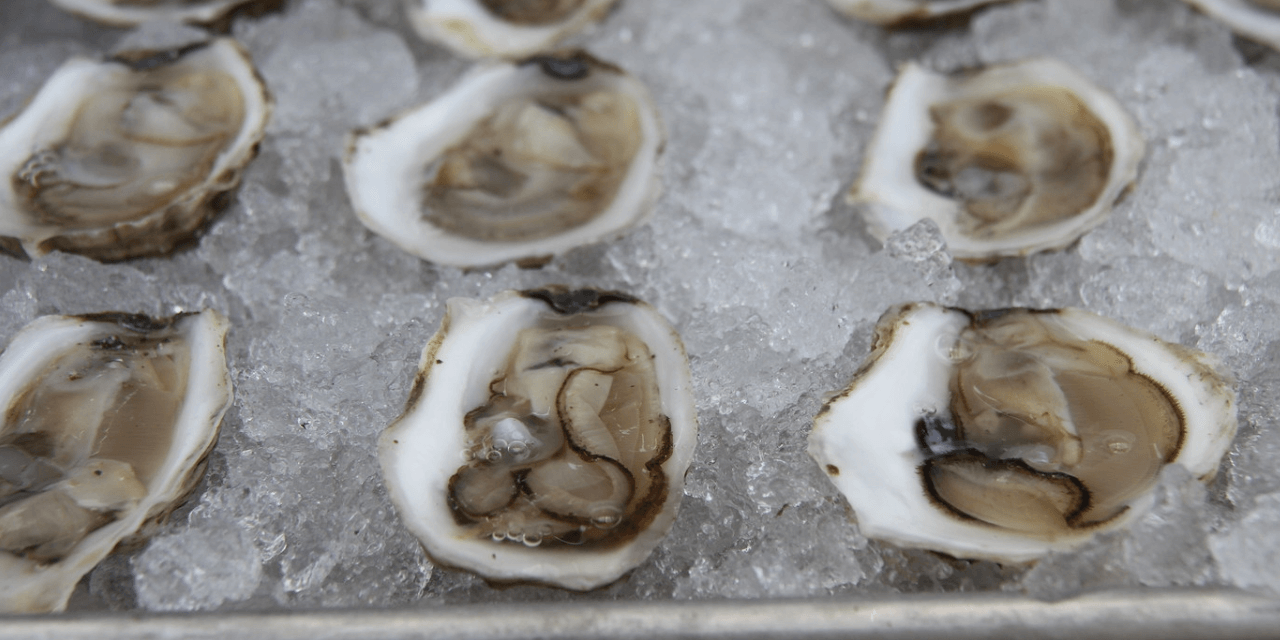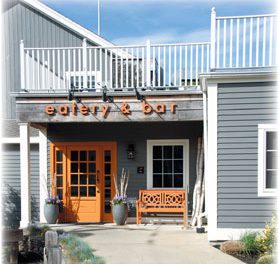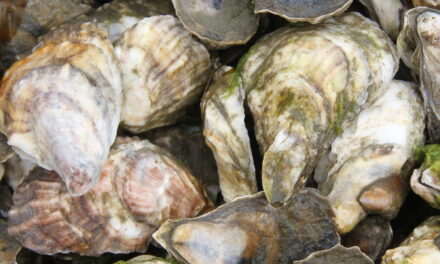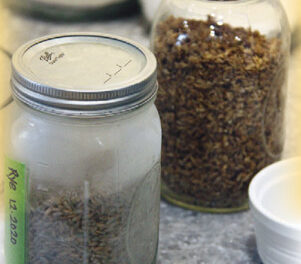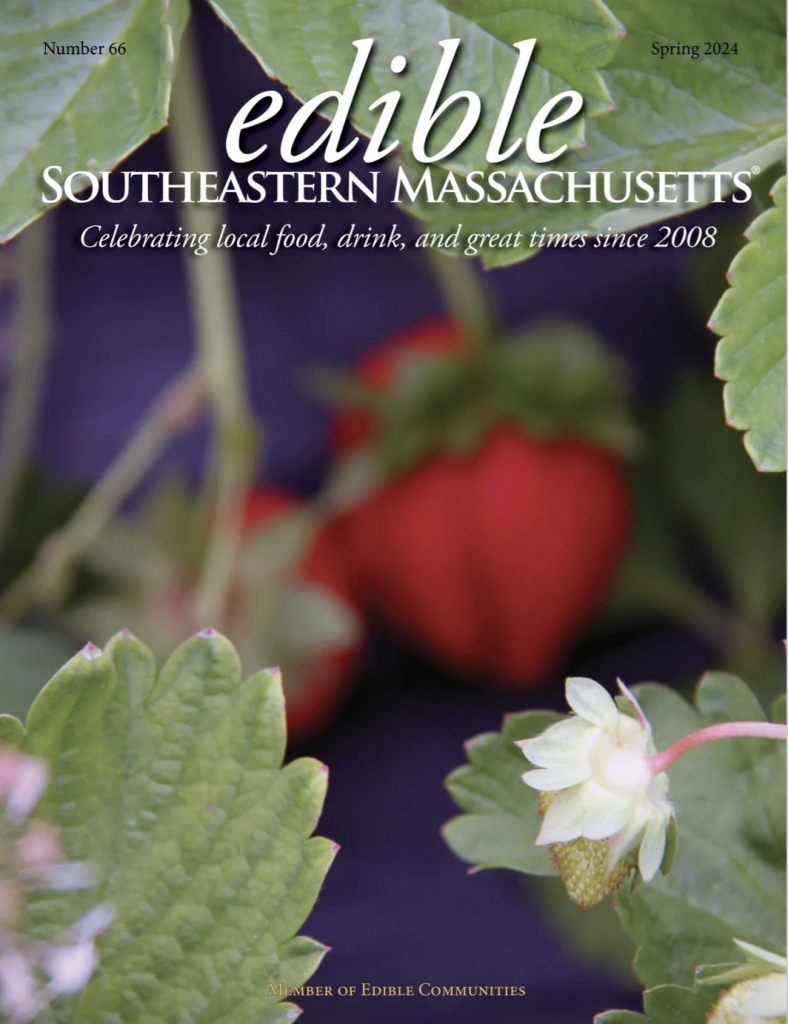By Marek Kulig.
…By Any Other Name…
It is not a truth universally acknowledged that every single oyster shucker has a “shucking name,” though it’s entirely probable that each might be in want of one. Like Shuck Norris or Shucky Chan— perhaps for the martial arts enthusiast; or Shuckquille O’Neal for the former high school athlete; for the horror movie buff, something like Bride of Shucky might do. And while the on-site shuckers at Island Creek Oyster Co.’s (ICO) Raw Bar on Duxbury Bay are still musing on theirs, the entire company is shucking out a global name for itself.
“There’s people in Napa Valley getting a taste of Duxbury Bay brine in their oyster,” says Chris Sherman, President of ICO and a once-itinerant seaman before he pulled up anchor and put down stakes in Duxbury, Massachusetts. “And over here, we’re getting Pacific Coast oysters.” And the association between the oyster brine and Napa Valley’s grapevine doesn’t end with this rhyme.

K Tubes (short for Kalwall) are full of varying types of algae grown in the hatchery. Algae equals baby oyster food.
Oyster Nomenclature
If you’ve ever heard anyone speak with genuine honesty about wines, flavor profiles especially, you’ll notice they use words like minerality and acidity, vegetal, and buttery, and when you swirl and sip, you know what they mean. The same is true for oysters.
“With Island Creeks (which gets its name from an actual creek that runs into Duxbury Bay),” Chris posits, “you get vegetal notes with the bottom-cultured ones, and more umami and sweet with the surface.” Raw bars too list tasting notes. And it gets intricate when considering what’s called the finish—here, the sensitive, discriminating palate can distinguish earthy from brackish or watercress from grassy.
In true kindred spirit fashion, like the grape has terroir, the oyster has merroir. So whereas wine is affected by variables such as soil, elevation, and intensity of sunlight, oysters are impacted by tides, distance from rivers, the algae on which they feed, and more.
Chris, who’s been working for ICO for ten years, believes texture is a determining factor of quality. “You can get an oyster that’s got a toothy bite, or one that’s mushy. The sweet spot is somewhere in the middle.” Of course, a sure path to developing a sophisticated understanding of oysters’ complexity is to visit ICO’s headquarters in Duxbury.
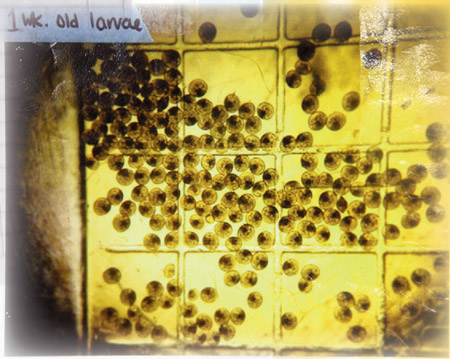
One week old oyster larvae called veligers under a microscope
Touring ICO
Tours of the quaint but always active campus can be booked online through ICO’s website. Emily Weedon is responsible for the tours’ remarkable success. “They sell out pretty fast—even more so on the weekends.” The walking tour of the property includes the hatchery, a former marine lab renovated for halfshell interests. The process of producing some of the world’s most acclaimed oysters begins here.
Around the back is a working harbor, from which up to a dozen tourists can take a 27-foot Carolina Skiff over to the farm as they listen to the history of the region, lore of its people, and swish of the sea. Aboard they can learn to shuck oysters, harvested just below the belly of the skiff.
After the tour (although anytime is good), visitors can hang out at the year-old bayside Raw Bar. Helping Emily curate what feels like the Back Deck of Duxbury Bay is Jess Cagle. Also in charge of the wholesale department, Jess spends much of the summer Bar-side orchestrating optimal customer experiences. Jess insists the most special feature of the casual space is that “you can see where the oysters you’re shooting are taken from.” Aside from a few varieties of oysters, the menu includes tinned fish and conservas from Spain or Portuguese canning company José Gourmet, caviar from California, and various specials. The staff is happy to offer beverage pairing advice as well.
“We wanted to lift the lid off the brand,” says Chris, “promote the aquaculture food system.” And what better way to do that than to couple education with hospitality?
Chris acknowledges that the property is an ongoing project still in its early stages of aesthetic and practical transformation. The long-term vision is to “create a permanent HQ for all of ICO’s core business operations, a place for people to come learn about what we do and how aquaculture can help evolve our food system, and make the property an asset for the Duxbury community.” But he is grateful to have found a long-sought-after industrial and commercial space so close to the water. The priority is the oyster, after all.
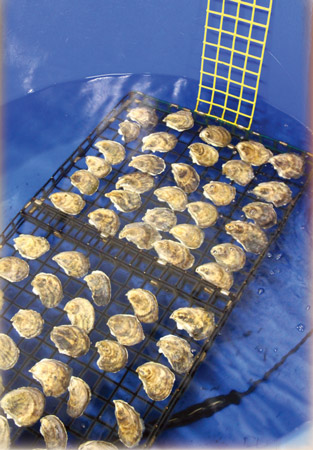
Specimens deemed to epitomize the Island Creek oyster recline in the brood stock room. Their spawn will maintain that unique character in the next generation.
A Local Product with Global Appeal
And with all that ICO accomplishes on-site, it’s easy to forget that distribution is a major part of its business model. “Distribution started by accident,” explains Chris. After September 11, 2001, the market struggled. Wholesalers reduced their numbers. Founder Skip Bennett, along with other oyster growers, was getting antsy. “So Skip loaded up his truck and went to Boston. He sold door-to-door out of the truck.”
With a little luck and a lot of hard work, the enterprise paid off. As a result of face-to-face interactions and sales, Skip developed meaningful relationships with several chefs who to this day follow Island Creek and order directly from it. “Our core customer,” Chris says, “continues to be the chef and/or owner of the independent restaurant.” And it was on one of these sales trips when asked by a chef what Skip wanted the oysters to be called that he coined the name, Island Creek.
Similarly, on the supply end, much of Island Creek’s core comprises independent farmers. “Many Massachusetts farmers have received grants,” adds Chris, “and oyster farmers were popping up regularly.” The Island Creek sales team tirelessly works to connect farmers and chefs. It delivers oysters directly to buyers from its farms and farms with which it’s affiliated—approximately 80 around the world.
One of those growers is Don Wilkinson of Ichabod Flat Oysters. Out of Plymouth, Don, who with his partners received a grant to start a farm in 2010, has been working with Island Creek since 2012. “Island Creek has a great Bay State product,” explains Don, “and they do a great job in terms of distribution. They’re consistently available, you know. Every bag is tagged with sourcing information, all that good stuff .”
Don has heard of Ichabod Flat oysters making it up and down the eastern seaboard. “A friend of mine went out to a restaurant in Key West, saw Ichabods, took a picture and sent it to me. That’s always neat to see.” Giving almost all of his energy to growing oysters, Don is delighted to have the long arm of Island Creek’s distribution department giving his product visibility.
As is Rocky Nook’s John Wheble. “I’ve been selling to them [ICO] since I started 10 years ago in Kingston Bay,” John says. “They’re easy to work with, and when I hear about Rocky Nooks being available at this or that restaurant, that’s a good thing.” Rocky Nook grows both petites and regulars. John describes them as sweet, with a clean finish.
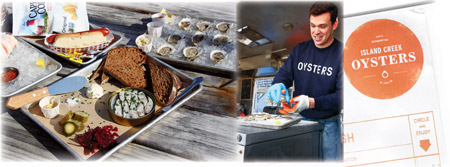
Trays of oysters and tinned fish prepared by Tim Mahoney, Assistant Manager of the Raw Bar at Island Creek Oyster farm.
Currently, oysters are having more than just their moment—they’ve hit a terrific stride. According to the Massachusetts Department of Agricultural Resources, the Shellfish industry generated $45.5 million for the state’s economy, along with hundreds of jobs.
But as Chris recalls, it took long days to build this kind of momentum. “I remember driving out to growers, cold calling. Buying week to week. Trying to keep the movement constant because of seasonality. There were about four or five of us working. We had one truck.”
On a foundation of relentless hustle and staunch resilience, Island Creek Oyster Co. has built a household name. Yet it has little interest in being the name in oysters. Much like its musing shuckers, Island Creek is interested in other names, like Damariscotta, Maine’s “Mookie Blues,” Narragansett’s “Pearly Whites,” and the aforementioned Ichabods and Rocky Nooks, both right down the shore from ICO. But the shuck doesn’t stop there. Not when the oyster is your world.
Island Creek Oysters
The Shop (Retail)
296 Parks Street
Duxbury, MA 02332
(781) 566-5019
Raw Bar at Island Creek Oyster Farm
401 Washington Street
Duxbury, MA 02332
Marek Kulig is an oyster neophyte. Although he’s a firm believer in the phrase “Better late than never,” he acknowledges that with the recent addition of shellfish to his diet, seafood lately has tasted better than ever. He must admit, too, that oyster shells are quite beautiful.

